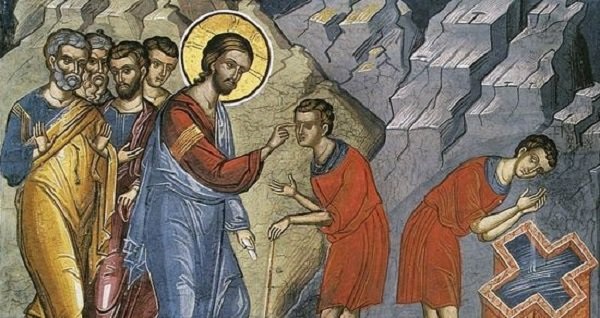Great faith
2 December 2018The Lord visited every city and region of Judea, where He cured all manner of diseases and bodily ailments. He preached repentance, bringing back those in error to the knowledge of the truth and confirming His teachings with strange miracles. He did so because people are usually more easily convinced by words rather than by deeds. As He went up to Jerusalem, Jesus passed through Jericho.
Outside the city, a certain blind man was sitting. He was blind as regards his bodily eyes, but not in terms of the eyes of his heart, since Jesus told him that he was saved because of his faith. The man asked helped from those who passed by, or to put it another way, he begged. On this occasion, he heard the movement of the crowd and asked what was going on. When he was told that Jesus was passing, he was overjoyed, because he’d heard of the great teacher and healer and the miracles He’d performed. He managed to approach Jesus and implored Him to cure him. He wanted Him to restore his sight. What the blind mand was asking of God and the Lord was no small or insignificant matter. He didn’t ask for gold, coin, food, covering or any of the other things he asked from those who passed by, although He Who gives all things to all people could have given him these. All he said was: ‘Lord, let me see again. Those who were in front sternly ordered him to be quiet; but he shouted even more loudly, “Son of David, have mercy on me!”’ (Luke 18, 38). Had the blind man’s faith [1] not been so fervent, he wouldn’t have shouted even louder after being told to be quiet. This is why he was asked to speak by the Saviour, to approach Him and to succeed in his goal, which was to receive healing.

What the blind man wanted was to be able to approach Christ. He was someone who believed in Him, set his hopes on Him, not simply because that’s what tradition says or just because of some superficial, formal relationship, but because that’s what he felt inside himself. Addressing Jesus as the Son of David is evidence of his considerable knowledge, his education in the Holy Scriptures and the teaching of the Prophets concerning the Person of Christ and also the task He was completing on earth.
Indeed, everything difficult and persistent and, even more so, saddening and painful- things which ordinary people and even the saints can’t cure- Christ can make disappear and can heal in a miraculous manner, as the wise and inspired God/Human Person that He is. And the Lord didn’t open only the external eyes of the blind man, but those on the interior, the eyes of the soul. Saint Gennadios, Patriarch of Constantinople says this is proved by the fact the man followed the Lord, glorifying God [2].
At various points in our life, we’re faced by people who have needs of one sort or another. When this happens, let’s not withdraw into our individual shell, but rather let’s open our heart, our self, to those who seek our assistance, whether that’s material, or, even more so, spiritual.
The blind man in today’s Gospel is a symbol of the humble and despised people in this world, but also of the spiritual state of each of us, which, unfortunately, is one of reduced vision. And yet, instead of trying to regain our sight with the curative powers of the Church, we’d rather stagnate, with our impaired eyesight. But then there’s a danger that we’ll lose our sight completely and not be able to see where we’re going. The blind man is an example for us to follow. We see his persistence in crying out to Jesus, which shows us how we, too, should persevere in our prayers, even if what we ask for isn’t granted immediately. God doesn’t ignore any of our requests. So long as we ask things which are beneficial for our soul. Any delay in the execution of our request lays bare our faith, our hope and our patience. It makes us examine ourselves, so that we see where we’re lacking, what we haven’t got and how we can improve our spiritual state.
We see the blind man following his benefactor in order to thank Him. Gratitude’s a necessary element of prayer for Christians, given how much kindness God has showered upon us [3]. Every day, God enters our lives, regardless of whether we even notice most of the time. With this miracle, as with every wonder, we’re helped to recognize that the Lord is God and human, sent by God the Father. We need to render glory to God Himself, and, at the same time, to surrender ourselves to the love of Christ. The most effective way of attracting the outpouring of God’s mercy towards us is through the continuous transcendence of sin and the aid of the curative sacraments, of Holy Communion and of Confession.
May it be our daily aim to overcome sin, our passions, and, together with David, to say to God: ‘Your mercy shall follow me all the days of my life’ [4].






